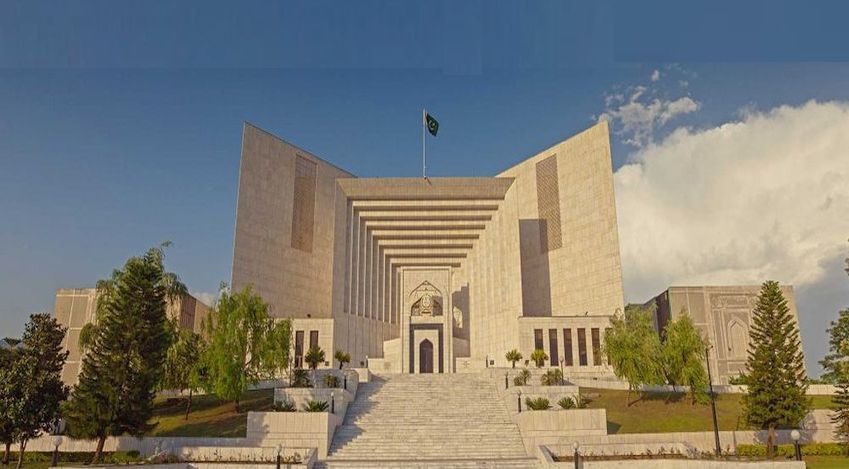Public Recruitment must strictly follow Legal Procedures, and Courts should not Interfere in Executive Decisions without clear Violations --- Supreme Court of Pakistan set aside Ruling of Balochistan High Court
Islamabad 08-03-2025: The Supreme Court of Pakistan has set aside a ruling of the High Court of Balochistan, declaring the recruitment process for various government posts null and void due to procedural irregularities. In a significant judgment in [Civil Petition No. 100-Q of 2023], the apex Court upheld the Government of Balochistan’s decision to scrap the flawed recruitment process and dismissed claims of legitimate expectation by the Petitioners.
The case originated from a constitutional petition filed before the High Court of Balochistan [Constitution Petition No. 2080/2022] by several candidates who had participated in a recruitment process conducted by the Planning and Development Department, Balochistan. The High Court ruled in favor of the Petitioners, directing the government to issue appointment letters to them, despite the department’s decision to nullify the process due to legal violations.
The Government of Balochistan challenged this decision before the Supreme Court of Pakistan, arguing that serious irregularities had been found in the recruitment process, making it legally untenable.
After hearing arguments from both sides, a three-member Supreme Court of Pakistan bench comprising Mr. Justice Amin-ud-Din Khan, Mr. Justice Muhammad Ali Mazhar, and Mr. Justice Syed Hasan Azhar Rizvi ruled in favor of the Government of Balochistan, setting aside the High Court’s decision. The Court identified multiple legal violations in the recruitment process, emphasizing that no vested right to appointment had been created for the Petitioners.
The Selection Committee unlawfully altered the number of posts:
- Five posts for Drivers (B-4) were advertised, but an additional post was added.
- A merit-based post for Statistical Assistant (B-14) was wrongly reallocated to a specific zone.
- An extra Stenographer (B-14) was recommended beyond the sanctioned vacancies.
- Selection Committee Composition Was Tampered With:
- A junior officer (B-17) was improperly inducted in place of a senior officer (B-19).
The Supreme Court of Pakistan ruled that these actions violated the Balochistan Civil Servants (Appointment, Promotion, and Transfer) Rules, 2009, rendering the entire process void.
The Supreme Court of Pakistan rejected the Respondents’ claim that clearing a test and interview automatically created a right to appointment. The Court ruled that:
- A candidate’s mere participation in the recruitment process does not guarantee employment.
- No appointment letters had been issued, meaning no legal right to appointment had been created.
Legal Precedents Cited:
- Abdul Wahab Vs. HEC (2020 SCMR 1129): No automatic right to a government job.
- Ghulam Rasool Vs. Government of Pakistan (2021 SCMR 1466): A vested right arises only when the selection process is completed legally.
The Supreme Court of Pakistan upheld the government’s authority to scrap a recruitment process if it is found to be legally defective. It ruled that the Balochistan government was justified in annulling the selection process because:
- The selection committee overstepped its authority.
- The composition of the committee was unlawfully altered.
- The recruitment process violated merit-based hiring principles.
Legal Precedents Cited:
- Muhammad Yaseen Vs. Federation of Pakistan (PLD 2012 SC 132): A recruitment process is invalid if it deviates from legal requirements.
- Ali Azhar Khan Baloch Vs. Province of Sindh (2015 SCMR 456): Merit-based recruitment is mandatory in public sector hiring.
The High Court of Balochistan had relied on the case of (2022 SCMR 694) to rule in favor of the petitioners. However, the Supreme Court of Pakistan distinguished the present case, holding that:
- Legitimate expectation applies only when recruitment follows legal procedures.
- Since the process was fundamentally flawed, no legitimate expectation of appointment existed.
Legal Precedents Cited:
- Uzma Manzoor Vs. Vice-Chancellor Khushal Khan Khattak University (2022 SCMR 694): Distinguished; doctrine of legitimate expectation does not apply when irregularities exist.
- Naveed Akhtar Vs. Government of Punjab (2021 SCMR 1187): Candidates must reapply if a fresh recruitment process is initiated.
In light of these findings, the Supreme Court of Pakistan ruled as follows:
- The appeal by the Government of Balochistan was allowed.
- The High Court of Balochistan’s decision was set aside.
- The recruitment process remains annulled.
- Candidates are free to reapply if a fresh recruitment process is initiated.
This judgment reaffirms several key principles of public sector recruitment and judicial review:
- Public recruitment must strictly follow prescribed legal procedures.
- Candidates have no vested right to appointment until official offer letters are issued.
- The government has the authority to scrap flawed recruitment processes.
Courts must not interfere in executive hiring decisions unless clear legal violations exist.
Powered by Froala Editor








